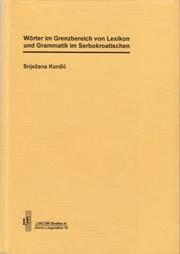
Wörter im Grenzbereich von Lexikon und Grammatik im Serbokroatischen
By Snježana Kordić
Subjects: Reflexives, Linguistics, Croatian, Pragmatics, Vocabulary, English, Slovak language, Czech language, Adverb, Macedonian language, Lexicography, Modality, Deixis, Noun, Sentences, Serbo-Croatian, Bulgarian language, Agreement, Negation, Spoken Croatian, Auxiliary verbs, Croatian language, Discourse analysis, Research, Existential constructions, Russian language, Word order, Nouns, Modality (Linguistics), French, Slavic languages, Serbian language, Morphology, German language, Subordinate constructions, Language, Quantifiers, Conjunctions, French language, English language, Verb, Slovenian language, Anaphora (Linguistics), Polish, Grammar, Particles, Serbo-Croatian language, Possessives, Speech, Polish language, Comparative Grammar, Spanish language, Semantics, Language and languages, Corpora (Linguistics), Syntax, Serbian, Verbs, Demonstratives, Belarusian language, Pronoun, Ukrainian language, Case, Spoken Serbo-Croatian, Clauses, Comparative and general Grammar, Relative clauses, Noun phrase, Statistics, Sociolinguistics
Description: The first chapter of the book deals with the semantic, grammatical and pragmatic characteristics of the personal pronouns. It also deals with the peculiarities of the third person personal pronoun and its relationship to the demonstrative pronouns. The polite form of the personal pronoun is discussed in the second chapter. A type of generalisation by means of the word čovjek (‘one’; German ‘man’) is analysed in the third chapter. In the fourth chapter, the demonstrative pronouns in Serbo-Croatian ovaj ‘this’, taj ‘that’ and onaj ‘that’ are compared with their respective equivalent pronouns in Polish, Czech and Russian. The fifth chapter is devoted to the demonstrative words evo/eto/eno ‘behold, here is’. The sixth chapter examines the syntactic and semantic peculiarities of Serbo-Croatian composite conjunctions in comparison with German, Russian, Polish and Czech. In the seventh chapter, information is given regarding the grammatical and lexicographic description of the existentially used verbs imati (habere) and biti (esse) in Serbo-Croatian. In the last chapter, the meanings and grammatical features of the full and modal verb trebati ‘need/should’ are described.
Comments
You must log in to leave comments.